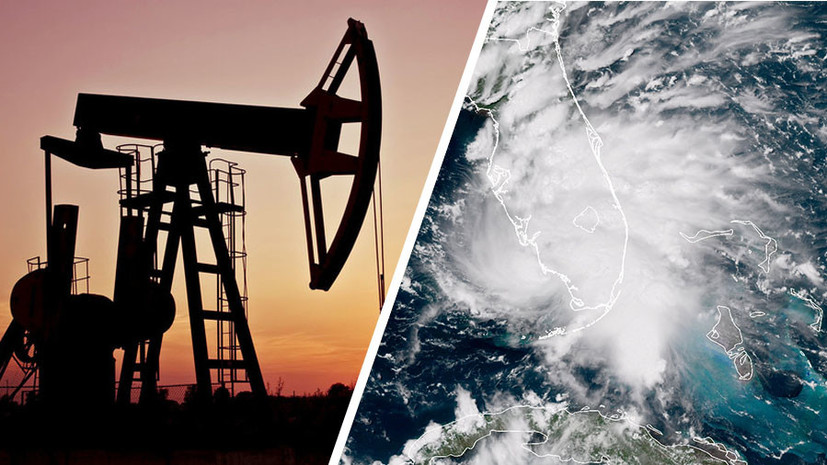The beginning of autumn was marked by a record rise in oil prices on the world market over the past two months. During trades on Tuesday, September 4, the barrel of raw materials of the Brent benchmark rose in price to $ 79, while the oil quotes of the American WTI grade exceeded $ 71 per barrel. The last time such values could be observed on July 10.
The increase in the cost of hydrocarbons occurs against the backdrop of alarming weather forecasts - Hurricane Gordon is moving toward the American coast. On Monday, September 3, due to natural disasters, Anadarko Petroleum Corp, an oil and gas company, stopped two drilling rigs in the Gulf of Mexico and evacuated its personnel. This is stated on the official website of the corporation.
As explained in an interview with RT analyst of the GC Forex Club Michael Rytik, such reports on hurricanes traditionally push the quotes of hydrocarbons up. Market players are laying the risks of possible interruptions in the extraction of energy resources.
"The decision to evacuate can negatively affect the production of oil in the US, which recently passed for 11 million barrels per day. Each day of the suspension of production in the Gulf of Mexico could deprive the world market of about 1.8 million barrels per day, "added Alen Sabitov, an analyst at Freedom Finance.
At the same time, according to RT experts interviewed, the American meteorological factor has become only one of the short-term reasons for the observed rise in price of oil. Analysts at the same time note a number of other problems with the supply of hydrocarbons in the global market. In particular, we are talking about American sanctions against Iran and possible restrictions for its partners, as well as on reducing oil production in Venezuela.
"Since May, Iran has reduced oil production by almost 0.3 million barrels per day. This, in turn, suggests that US sanctions are working. There are indications that China and India will have to reduce purchases of raw materials from the Islamic Republic, not to mention the US allies like Japan, South Korea and Taiwan. The demand of the last three for Iranian oil, according to our estimates, is about 0.5 million barrels a day, "Sabitov said.
Recall, the first wave of US restrictions on Tehran came into effect on August 7 and affected the trade in precious metals, as well as the automobile sector of the country. At the same time, the main package of sanctions will be introduced on November 5 and will extend to the energy sector of the republic and operations with the Central Bank of Iran.
Experts explain the fall in oil production in Venezuela by economic problems within the country. Thus, Alain Sabitov notes the threat of a decline in the production of raw materials before the end of 2018 below the level of 1 million barrels per day. At the same time, according to the expert, the intention of the government to harmonize gasoline prices on a par with the world could stop the trend to reduce production.
Price balance
The risks of adjusting oil prices are still present. So, according to Mikhail Rytik, the pressure on quotes is still exerted by the tariff opposition between the PRC and the US. Against the background of the escalating trade war in August, China suspended imports of American oil and, according to the expert, has not intended to resume it for some time.
Such actions, in turn, lead to a reduction in global demand for oil. At the same time, the situation significantly worsens the risks of the crisis in developing countries. First of all, we are talking about the beginning of the observed recession in Turkey and Argentina.
"Turkey and Argentina account for almost 1.8% of world GDP, and the effect of reducing their economies can spread globally along the chain. Moreover, in case of delaying trade wars, the growth of the global economy will slow down this year by 0.5%. If the tariff friction continues for the next year, the demand for oil may decrease by 1.5 million barrels per day, according to our estimates, which could negatively affect oil quotations, "Alen Sabitov added.
In addition, as Mikhail Rytik points out, the general trend for increasing oil production by shale producers is also a negative factor for the cost of energy resources. At the end of last month, the number of drilling rigs in the US after a short decline again began to grow. In the period from August 24 to August 31, their number increased by two units - up to 862 pieces. This is evidenced by the data of the oil service company Baker Hughes.
Nevertheless, analysts are confident that in the near future quotations will be kept near current values. According to Alain Sabitov, in view of the ongoing trade wars and the threat of a slowdown in the economies of the oil-consuming countries, serious reasons for further price increases on the market are not yet available.
Mikhail Rytik, in turn, speaks about the absence of factors for a serious reduction in the cost of hydrocarbons. Against this background, the expert does not expect sharp fluctuations in the market and predicts the preservation of the price of Brent crude near $ 80 per barrel in the short term.

